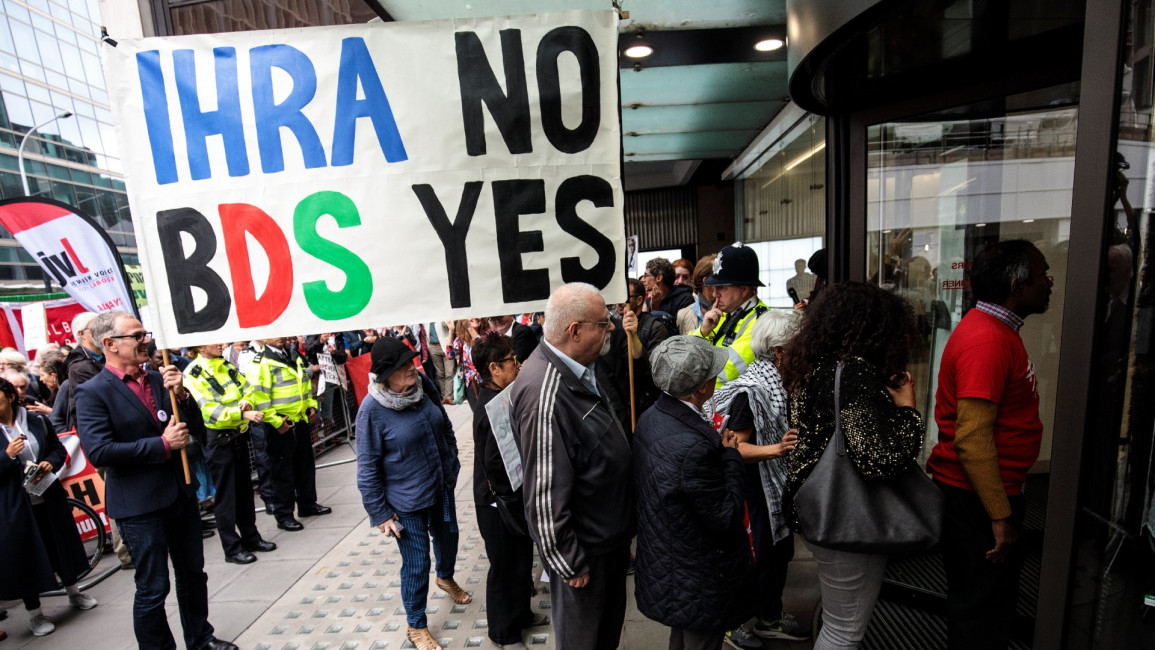
The IHRA definition of antisemitism is an attack on free speech
In addition, the letter points out that, contrary to what we are told, the definition and it's framing of the issue has led to "side-lining the very real threat to Jews coming from right-wing white nationalist movements in Europe and the US". They wrote that by undermining the rights of Palestinians, "the IHRA definition betrays an attitude upholding Jewish privilege in Palestine instead of Jewish rights, and Jewish supremacy over Palestinians instead of Jewish safety."
The list of signatories is extensive, with prominent voices from around the world as well as academics who have contributed considerably to various fields. However, it is important to underscore how bad the situation has become, and how relentless the attacks on Palestine solidarity have been, that such a timely letter is necessary.
Governments across Europe and North America are using the IHRA definition to target efforts of solidarity with the Palestinian struggle for liberation, and shamelessly facilitate the whitewashing of Israel's colonial crimes. But many are now finally speaking up about the repressive tendencies associated with the use of the definition. Even one of the authors of the definition, Kenneth Stern, has stated that the definition is not being used in the way that it was intended. He cited its manipulation by the Trump administration as an example, and wrote about his concerns over its weaponisation by "right-wing Jewish groups" and the delegitimisation of Palestine solidarity activism. None of this has caused enough of a rumble to undermine the definition and its defenders, however.
Closer to home in the UK, the situation seems to be deteriorating, as universities are fast becoming a key target for implementation of the IHRA definition.
 |
Governments across Europe and North America are using the IHRA definition to target efforts of solidarity with the Palestinian struggle for liberation |  |
In fact, David Feldman, director of the Pears Institute for the Study of Antisemitism at Birkbeck (University of London) has just warned of the detrimental impacts that the recent IHRA "interventions" by the secretary of state for education. Gavin Williamson sent a letter to all university vice-chancellors, calling on them to adopt the definition in order to prove their commitment to anti-Semitism. Should they fail to do so, they could lose funding and degree awarding powers.
Feldman has said that, "the chilling impact on students, on academic and professional staff and on institutions dedicated to debate and robust discussion will be corrosive and long lasting." This echoed Stern's concerns, a self-proclaimed Zionist, who also worried that such tactics would stifle people's right to critique and debate subjects like Zionism within an education context.
Commitments to equality and diversity via institutional processes do not mean that our campuses are entirely free of oppression, and Williamson's policy presents the idea that universities have not been challenging acts of antisemitism at all until now. Simultaneously - and crucially, this serves to delegitimise anti-Zionism and Palestine solidarity activism.
Twitter Post
|
Feldman's view that the IHRA definition will "privilege one group over others by giving them additional protections, and in doing so will divide minorities against each other" is not helpful. The specifics of the definition aside, mobilising people against particular forms of oppression is often required depending on the political realities we face. The reason people should be opposing the IHRA definition is certainly not because of its desire to specifically address rising antisemitism, but rather because it absolutely undermines any opportunity to do so.
Read more: Palestinians can expect Israel's Trump-era plans to continue under Blinken
Indeed, it sidelines the demands made by anti-racist movements - made up of workers, students, academics, activists, politicians and many more - who have fought, marched and lobbied for a recognition of the structural nature of oppression and a commitment to root it out. Instead the IHRA definition focuses exclusively on inter-personal incidents and extremely dangerously collapses critiques of Israel and Zionism with antisemitism.
It is also important to point out how disingenuous the sudden desire of the Tories is to tackle antisemitism in universities. Not only have they done much - and continue to expend considerable energy - to ensure that racism is embedded within the education system, but they also continue to normalise antisemitism through relationships with the fascist Hungarian government, to Steve Bannon and the anti "cultural Marxism" brigades - a famous antisemitic dog whistle straight out of the 1930s.
A similar argument has been made by many campaigners who oppose the government's Prevent agenda. While the state attempts to present the counter-extremism project as a way of "safeguarding" people, activists and professionals highlighted that universities already had structures in place to do so.
 |
The state should never be given the power to determine the legitimacy of our resistance and solidarity, because it seeks to destroy both |  |
They did not claim that these are in any way perfect, but have called out the state's narrative that it was somehow protecting students and staff by over-policing them, repressing their political expression and encouraging racial profiling. Instead, many education practitioners and student activists called on the government to provide better resources and funding for the available safeguarding services.
The same holds true here. The impressive mobilisation of talent and insight behind this letter powerfully summarises all these issues: the failures to identify antisemitism effectively, its attempt to delegitimise Palestine solidarity, and its narrative which undermines the ability for Palestinians to describe the violence and racism they face at the hands of Zionism and the Israeli state.
Hopefully, many will feel empowered by it to continue to stand in solidarity with the Palestinian people and their struggle, by refusing the current attempts to use the IHRA definition to attack free speech, repress social justice work and criminalise Palestine liberation in particular.
However, we also must seek to re-organise not just over the right to name and protest the continued colonisation of Palestine, but also in order to implement Boycott, Divestment and Sanctions campaigns across the country from local councils to universities - yet another political right the Tory government is currently targeting.
The state should never be given the power to determine the legitimacy of our resistance and solidarity, because it seeks to destroy both.
Malia Bouattia is an activist, a former president of the National Union of Students, and co-founder of the Students not Suspects/Educators not Informants Network.
Follow her on Twitter: @MaliaBouattia
Have questions or comments? Email us at: editorial-english@alaraby.co.uk
Opinions expressed here are the author's own, and do not necessarily reflect those of her employer, or of The New Arab and its editorial board or staff.


![President Pezeshkian has denounced Israel's attacks on Lebanon [Getty]](/sites/default/files/styles/image_684x385/public/2173482924.jpeg?h=a5f2f23a&itok=q3evVtko)



 Follow the Middle East's top stories in English at The New Arab on Google News
Follow the Middle East's top stories in English at The New Arab on Google News


